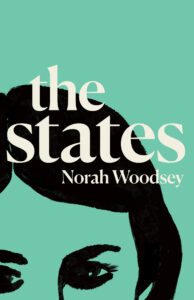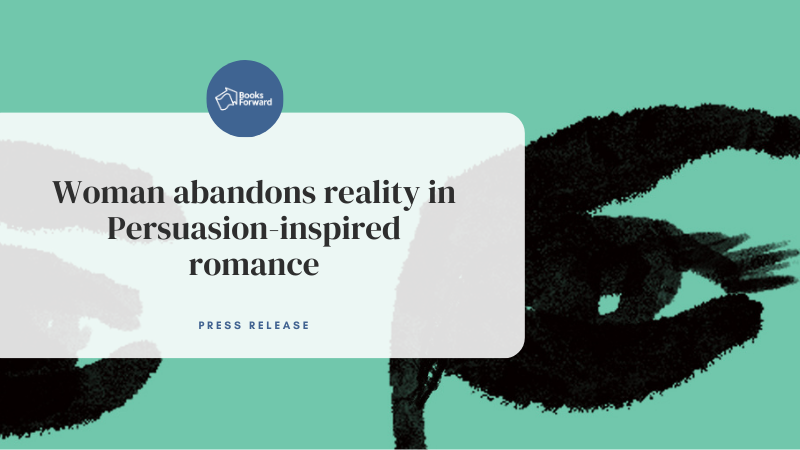Dream-induced sci-fi twist spins the classic story of second chances
 SAN FRANCISCO, CA– Dream a little dream of better days gone by in this speculative contemporary reimagining of Jane Austen’s classic Persuasion. The States (self-published, Apr 30, 2024) by Norah Woodsey introduces young Tildy Sullivan, who enters a sleep-study allowing her to lucidly dream of summers in Ireland and the boy she was forced to leave behind.
SAN FRANCISCO, CA– Dream a little dream of better days gone by in this speculative contemporary reimagining of Jane Austen’s classic Persuasion. The States (self-published, Apr 30, 2024) by Norah Woodsey introduces young Tildy Sullivan, who enters a sleep-study allowing her to lucidly dream of summers in Ireland and the boy she was forced to leave behind.
From the acclaimed author of The Control Problem and Lifeless, Norah Woodsey offers a fresh twist on the beloved classic. Four years in the making, this novel was first drafted during NaNoWriMo 2020. Focusing on her love for Jane Austen and inspired by Galway, Ireland. Woodsey reinterprets Anne as a young contemporary woman faced with the harsh realities of her family’s situation and the desire to escape into a dream world.
Tildy Sullivan is the middle child in an elite yet fading Manhattan family. Her quiet practicality hides her deep, profound longing for childhood summers in western Ireland. She also carries a secret regret. After her mother’s death, she’s persuaded to abandon Ireland and the love of the local boy, Aiden.
When Tildy volunteers for a lucid dreaming experiment, it gives her all she wants – a life lived for her family during the day and a secret, perfect Ireland of her own at night. Will she face reality, or succumb to the ease of her dreams?
THE STATES is a modern reimagining of Jane Austen’s Persuasion, a story of love, obligation, and second chances.
“The States”
Norah Woodsey | April 30, 2024 | Speculative Fiction, Contemporary Romance
Ebook | 9798988445708 | $9.99
Paperback | 9798988445708 | $15
 NORAH WOODSEY is the author of The States, The Control Problem, Lifeless, and the novella When the Wave Collapses. After short careers in finance and tech, she has dedicated herself to creating fiction. Her subjects of intense interest but not quite expertise include history, physics, genetics, sociology and gender studies. The product of four generations of Brooklynites,“she now lives in California with her husband, children and their dog Saoirse. Find out more about her at norahwoodsey.com.
NORAH WOODSEY is the author of The States, The Control Problem, Lifeless, and the novella When the Wave Collapses. After short careers in finance and tech, she has dedicated herself to creating fiction. Her subjects of intense interest but not quite expertise include history, physics, genetics, sociology and gender studies. The product of four generations of Brooklynites,“she now lives in California with her husband, children and their dog Saoirse. Find out more about her at norahwoodsey.com.
Follow Norah Woodsey on social media:
Instagram: @nwoodsey | BlueSky: @norahwoodsey.bsky.social
In an interview, Norah Woodsey can discuss:
- Her process for reimagining the classic story Persuasion and making it her own
- How Jane Austen inspired her writing and how she modernizes her story for a fresh audience
- Her journey writing this novel–from its original NaNoWriMo draft in 2020 to a published version in 2024
- The similarities she has with Tildy’s struggle to connect with her Irish heritage as an American and its themes throughout the story
- How finding happiness through nostalgia keeps Tildy moving forward despite reality
- Why she chose to self-publish all of her books
- How she transitioned from writing hard science fiction to a softer romance story
Advanced Praise for The States
“…the novel casts a definite spell over the reader, who can’t help but be drawn into Tildy’s fantasies. It’s a triple escape, after all: into a dream, over the sea, to the arms of a lost love.”
-Kirkus Reviews
“A contemporary reimagining of Jane Austen’s Persuasion, this lovely novel from Woodsey (author of When the Wave Collapses) is rich in romance, fantasy, and a tender yearning to make the best of a do-over.”
-PW’s BookLife Reviews
”The novel is clever in its explorations of escapism and wish fulfillment. Despite the allure of dreaming, Tildy’s knowledge that real longings demand real actions also results in pain.”
-Foreword Clarion Reviews
“Any Janeite will recognize Norah Woodsey’s THE STATES by the first chapter as a modern retelling of Miss Austen’s Persuasion…while the foundation of the story is indeed based on that great novel, this author has really thought about the necessary changes a modern context implies for her heroine’s life.”
-IndieReader Review
An Interview with
Norah Woodsey
1. Did The States originate as a reimagining of Persuasion or did that happen later in your writing process?
Initially, the story began as a NaNoWriMo in the depths of lockdown. Years later, I took a look at what I had written and realized there was hardly any conflict, and what little there was looked a lot like Persuasion, my favorite Jane Austen novel. I think we all felt the longing Anne Elliot feels in that story during 2020 – a world was lost to us and connections were left incomplete.
2. Why Persuasion? What drew you to that story and its characters?
For me, Jane Austen’s last completed novel is her most accessible. We all have paths untaken, that we look back on with complicated emotions. While Elizabeth Bennett is a heroine in the truest sense, Emma is wealthy and beautiful and admired, the Dashwoods are delightful women in complicated circumstances, etc, Anne Elliot must evolve to achieve her happiness. She has to escape a prison of her obligations, ones that no one evidently feels towards her. I also wanted to explore her mother, the absent heart of Persuasion who is often the unspoken center of Anne’s choices, though she herself is never really described in any detail.
3. You have discussed that some of the dialogue you wrote was inspired by conversations between your grandmother and her cousin, Caitlín Maude. Can you tell us more about this?
Growing up, my grandmother told me about her visits to family in Ros Moc, a village in Connemara where my grandmother’s family came from. She specifically told me about one cousin, a fierce intellectual whose anger gave her comfort in the aftermath of my uncle’s death, a young man drafted in the Vietnam War. I knew of Caitlín’s accomplishments and how she reportedly resented speaking in English to my ignorant family members, but like a lot of grandchildren I didn’t really look her up until after my grandmother had passed away. Caitlín Maude was a poet, sean-nós singer, anti-war activist who died far too young. Her poetry and interviews are really stunning. My grandmother mourned her, the loss of what she had to teach those around her, as different as they were.
4. The States began as a draft during NaNoWriMo. What was your journey of taking your book all the way to publication like?
The first thing I did was buy another copy of Persuasion, not a sacrifice in the least! I read the novel as a writer, noting how each character’s motivations were revealed, what moments would pose a challenge in a modernization. I also listened to the audiobook several times, which helped give me a feel for the flow of the overall story structure. Then, I rewrote the original NaNoWriMo. Many scenes that I adored were cut, others changed beyond recognition, the order shuffled. The original had very little conflict, few obstacles, and hardly any tension, unlike Persuasion. That said, I feel as though the heart of the original and The States are the same. Longing and regret can tempt you into accepting misery, but overcoming that impulse is a great hero’s journey.
5. How has your experience of feeling like an “outsider” to the Irish language influenced your writing?
One of my earliest memories is going to a family reunion in Brooklyn and hearing older relatives sitting around a beat up circular table, leaning back in metal folding chairs and speaking to one another in Irish. I don’t know what they were saying. There was a wall between the generations built of this language that no one had bothered to teach us. It’s weird to have Irish citizenship without knowing the language, particularly when family not far removed from me have dedicated their lives to saving the language from oblivion. So I knew if I ever wrote a book set in Ireland, there would have to be Irish in it. I hired an amazing translator, Andrea Brown, to get the passages correct. I made sure to include some words I remember the most vividly, such as ‘sutach’ – a hearty baby boy, something I heard a lot when my brothers were around, and amadán, a fool or idiot. That one I heard a lot, too!
I tried to use the language in the story as close to my own experience with it, but also in a way that is likely more familiar to first generation Americans whose parents came from a non-English speaking country. Tildy rarely uses the language when she speaks, but she understands it, most of the time. I felt like that could best represent her own relationship with the country and the past she wishes to return to – a sense of partial belonging that is frustratingly incomplete.

A former award-winning journalist with national exposure, Marissa now oversees the day-to-day operation of the Books Forward author branding and book marketing firm, along with our indie publishing support sister company Books Fluent.
Born and bred in Louisiana, currently living in New Orleans, she has lived and developed a strong base for our company and authors in Chicago and Nashville. Her journalism work has appeared in USA Today, National Geographic and other major publications. She is now interviewed by media on best practices for book marketing.

